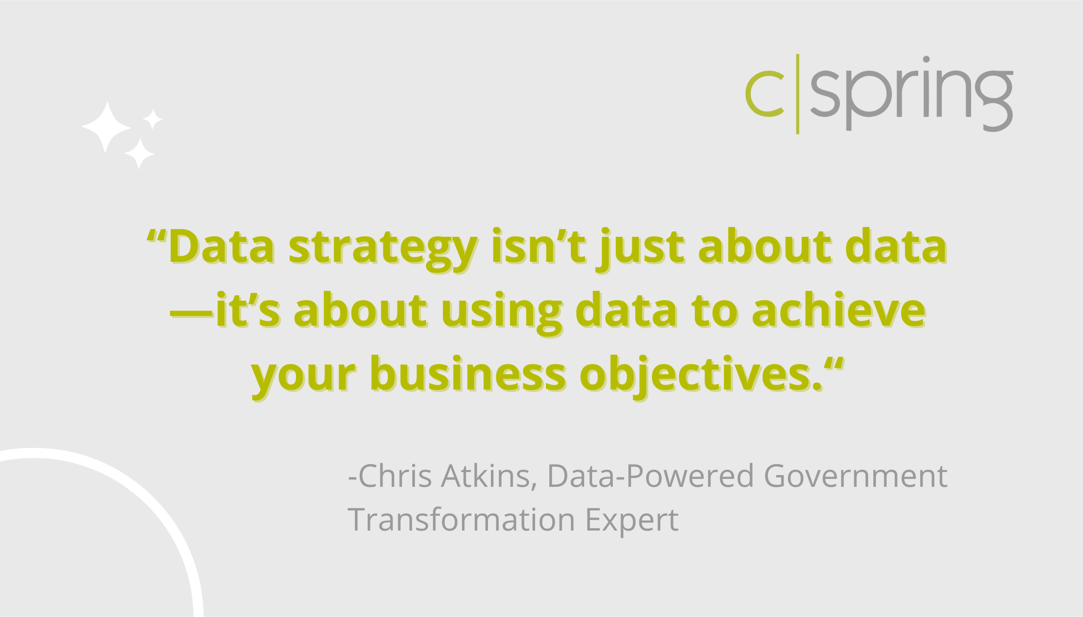
Why Executives Must Lead on Data Strategy—Now
Why Executives Must Lead on Data Strategy—Now
“Success isn’t a destination; it’s every step you take towards that destination where you’re making progress.”
If your organization’s AI ambitions don’t start with a clear, leader-driven data strategy, you’re building on quicksand. That was the message from Chris Atkins, former Director of Indiana’s Office of Management and Budget and Strategic Advisor to CSpring, at last week’s Executive Data Luncheon event.
Chris delivered an unfiltered look at why data strategy is not a side project—it’s a leadership imperative that drives innovation, accountability, and measurable results.
The Executive Imperative
Too often, data strategy is treated as a technical problem for IT to solve. Chris challenged this thinking:
“Data strategy is business strategy. The vision and priorities must come from leadership.”
Technology teams may execute, but it’s executive leaders who define the outcomes, set priorities, and drive the cultural change that makes data strategy work.
Using the Indiana Management and Performance Hub (MPH) as a case study, Chris illustrated how a fragmented, spreadsheet-driven environment was transformed into a cross-agency engine of innovation. What began as a response to urgent policy issues—such as Indiana’s high infant mortality rate—evolved into a statewide model for transparency, governance, and performance measurement.
Why it Matters Now
The urgency is clear: AI is only as valuable as the data it runs on. Without clean, well-governed, and accessible data, organizations risk:
-
Making flawed decisions
-
Wasting resources
-
Losing public or customer trust
The numbers don’t lie:
-
Organizations with a mature data strategy are 2.5x more likely to achieve positive ROI from AI investments (Deloitte, 2023).
-
Over 70% of successful AI adopters have C-level executives actively involved in data governance (McKinsey, 2023)
In other words, the competitive advantage belongs to leaders who start now.
Culture, Collaboration, and Change
While tools and platforms matter, Chris emphasized that culture is the foundation of effective data strategy.
A winning approach requires:
-
Clear ownership – Data owners who are engaged problem-solvers, not passive custodians
-
Cross-functional collaboration – Business and IT operating as partners, not silos
-
Direct connection to outcomes – Data initiatives tied to goals that matter for customers, constituents, and stakeholders
“The process of building your data strategy delivers immediate value—better data quality, stronger governance, and higher trust.”
Key Takeaways for Executives
- Data strategy is a business imperative. Treat it like you would any core growth initiative.
- Start with outcomes. Executive engagement grows when conversations focus on results, not just tech.
- Act now for AI readiness. The sooner you start, the greater your competitive advantage.
- Build the culture first. Governance, collaboration, and trust are as critical as technology.
From Vision to Impact
Chris and Jon Molendorp, CSpring’s VP of Delivery, closed the session with a reminder:
“Success in data strategy isn’t a final milestone—it’s consistent progress toward better data, better decisions, and better results.”
At CSpring, we help organizations bridge the gap between vision and execution—designing data strategies that align leadership priorities, technical execution, and cultural change to deliver measurable impact.
Ready to connect your leadership vision to results?
Let’s talk about your data strategy.
About the Executive Luncheon Series
CSpring’s Executive Luncheon Series is an invite-only event that brings together thought leaders and industry experts to explore strategies that help organizations thrive in a data-driven world. If you’d like to be a part of the conversation, reach out here.
